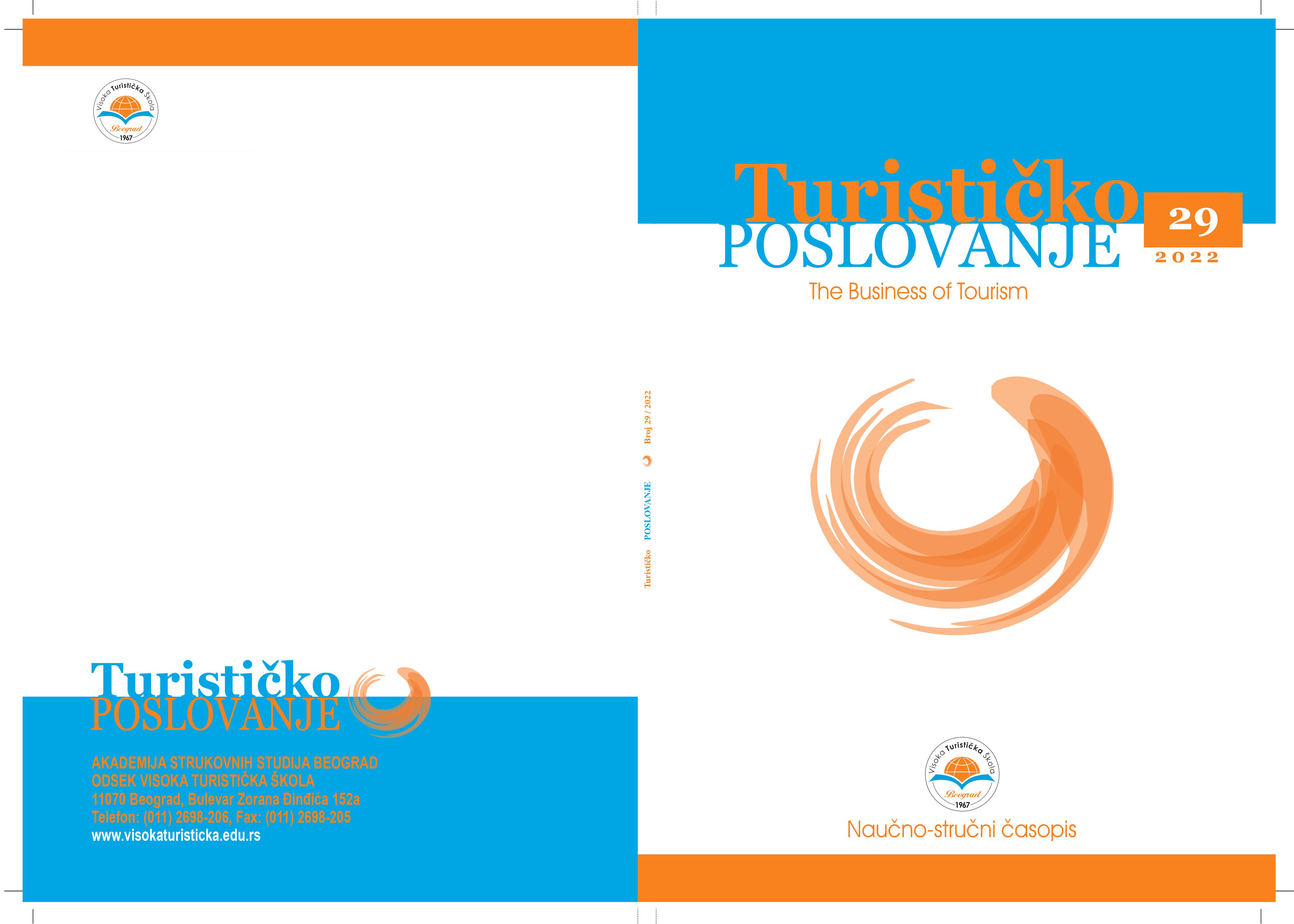KONCEPT PROSTORA U KNJIŽEVNOM TURIZMU
Sažetak
Cilj rada je da prikaže na koji način su predstavljeni i interpretirani prostori u književnom turizmu. Uzimajući u obzir savremena poststrukturalistička i postmoderna tumačenja kulture i turizma istražićemo u kakvom su odnosu književni prostori i posetioci. Drugim rečima, interesuje nas na koje načine književni prostori utiču na doživljaj posetilaca istih, odnosno na koji način posetioci dodeljuju značenje fiktivnim prostorima koja postoje u stvarnom svetu i obrnuto (stvarnim prostorima koja postoje i u fiktivnom svetu). Poći ćemo od pretpostavke da je priroda književnog turizma takva da neizbežno briše granice između fiktivnog i nefiktivnog u doživljaju turiste, koji postaje aktivan učesnik kako u kreiranju potencijalne ponude, tako i prihvatanju autentičnog iskustva, odnosno doživljaja, koje je lično i subjektivo. Kako bi se kreirala kvalitetna turistička ponuda ljubiteljima književnosti potrebno je dobro razumeti način na koji posetioci doživljavaju ovakve prostore, jer je za popularizovanje određene lokacije i uspešne turističke ponude neophodno uzeti u obzir više faktora, uključujući i sam kreativni čin posetilaca.
Reference
Bart, R. (1999) Smrt autora. U: Beker M. Suvremene književne teorije. Zagreb: Matica hrvatska, str. 196-201.
Baudrillard, J. (1994) Simulacra and Simulation. Ann Arbor: University of Michigan Press
Budgen, F. (1972) James Joyce and the Making of ‘Ulysses’ and other writings. London: Oxford University Press.
Darici K. (2015) To draw a map is to tell a story. Interview with Dr. Robert T. Tally Jr. on Geocriticism. Forma. Revista d’Estudis Comparatius, Art, literatura, pensament. Universitat Popmeu Fabra,11,27-36 [online] https://raco.cat/index.php/Forma/article/view/294989 [pristupljeno 03.02.2022].
Fisk, Dž. (2001) Popularna kultura. Beograd: Clio.
Fuko, M. (2005) Druga mesta. U: Milenković P. i Marinković D. Mišel Fuko: 1926–1984–2004 . Novi Sad: VSA, str. 29-36.
Herbert, D. T. (2001) Literary Places, Tourism and Heritage Experience. Annals of Tourism Research, 28 (2), 313-333.
Hoppen, A., Brown, L. and Fyall, A. (2014) Literary Tourism: Opportunities and Challenges for the Marketing and Branding of Destinations. Journal of Destination Marketing & Management, 3(1), 37-47.[online] dostupno na: http://dx.doi.org/10.1016/j.jdmm.2013.12.009 [pristupljeno 03.02.2022.].
Jiang, L., and Yu, L. (2019) Consumption of a literary tourism place: a perspective of embodiment. Tourism Geographies, 22, 127 - 150. Dostupono na: https://www.tandfonline.com/doi/abs/10.1080/14616688.2019.1586985?journalCode=rtxg20 [pristupljeno 03.02.2022.].
Lefebvre, H. (1991) The Production of Space. Oxford: Basil Blackwell Ltd.
Lipovšek, E and Kesić, S (2014) Journeys beyond pages: The use of fiction in tourism. Turističko poslovanje, 14, 51-60.
Lovereading. [online]. Dostupno na https://www.lovereading.co.uk/bookmap/# [pristupljeno 15.02.2022.].
Morris, C. (2017) Secular relics: Narrative objects and material biography in the museums of Darwin, Elgar & Holmes (unpublished PhD Thesis), University of the West of England.
Pocock, D.C.D. (1987) Haworth: the experience of literary place. In: Mallory, W.E. and Simpson-Housley P. (eds). Geography and Literature. New York: Syracuse University Press, pp. 134-142.
Quinteiro, S and Baleiro, R. (2018) Key concepts in literature and tourism studies. Lisboa: Centro de Estudos Comparatistas.
Schaff, B. (2011). “In the Footsteps of ...”: The Semiotics of Literary Tourism. KulturPoetik, 11(2), 166–180 [online]. Dostupono na: http://www.jstor.org/stable/41305930 [pristupljeno 27.01.2022.].
Seaman, A. N. (2016) Exploring the Connections Between Literary Places, Literary Texts, and Tourist Performance (PhD Thesis), Clemson University.
Seaman, A.N. (2019) Making literary places. In Jenkins, I and Lund, L.A. Literary tourism: theories, practices and case studies. Wallingford, Oxfordshire, UK ; Boston, MA : CABI, 140-148.
Smith, M. (2009) Issues in cultural tourism studies. London: Routledge.
Smith, Y. (2012) Literary Tourism as a Developing Genre: South Africa’s Potential, (Magister Paper), University of Pretoria.
Soja, E. W. (1996) Thirdspace: Journeys to Los Angeles and other real-and-imagined places. Cambridge, Mass: Blackwell.
Squire, S.J. (1988) Wordsworth and Lake District Tourism: Romantic Reshaping of Landscape. Canadian Geographer / Le Géographe canadien, 32, 237-247 [online]. Available at: https://doi.org/10.1111/j.1541-0064.1988.tb00876.x [03.01.2022.].
Squire, S.J. (1996) Landscapes, places and geographic spaces: Texts of Beatrix Potter as cultural communication. GeoJournal 38, 75–86 [online]. Dostupno na: https://doi.org/10.1007/BF00209121 [pristupljeno 03.01.2022.].
Tally, R.T. (2011) Translator’s Preface: The Timely Emergence of Geocriticism. In: Westphal, B. Geocriticism: Real and Fictional Spaces. Basingstoke: Palgrave Macmillan, ix-xiii.
Tally, R.T. (2013) Spatiality. New York: Routledge.
The world of Beatrix Potter. [online]. Dostupno na: https://www.hop-skip-jump.com/attraction/ [pristupljeno 10.02.2022.].
Tuan, Y. F. (2001) Space and Place: The Perspective of Experience. Minneapolis, MN: University of Minnesota Press.
Urry, J. (1995) Consuming places. London: Routledge.
Urry, J. (2002) Mobility and Proximity. Sociology 36, (2), 255-274.
Watson, N.J. (2006) The Literary Tourist: Readers and Places in Romantic and Victorian Britain. Basingstoke: Palgrave Macmillan.
Westover, P.A. (2012) Inventing the London of literary tourists: Walking the romantic city in Leigh Hunt’s “Wishing Cap” essays. European Romantic Review, 23(1), 1-19.
Westphal, B. (2011) Geocriticism: Real and Fictional Spaces. Basingstoke: Palgrave Macmillan.
Woolf, V. (1986) Literary geography. In: McNeillie A. The Essays of Virginia Woolf. San Diego: Harcourt Brace Jovanovich, pp. 28–42.

